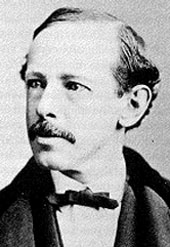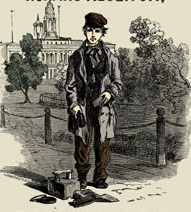
Horatio Alger, Jr. (January 13, 1832-July 18, 1899), briefly a Unitarian minister, was a popular nineteenth-century author of juvenile fiction. His “rags to riches” stories portrayed poor boys in America making good.
Horatio’s parents were Olive Augusta Fenno and Horatio Alger, Sr., a Unitarian minister. His father (1806-1881), a native of South Bridgewater, Massachusetts, was a graduate of Harvard, A.B., 1825, and the Divinity School, A.M., 1828. Alger, Sr. had been ordained at the Chelsea (later Revere, Massachusetts) Unitarian Church in 1829. Because he lost money speculating in the land boom of the 1830s, his children grew up in a household with few financial resources. To supplement the family’s income he began to farm. In spite of this measure, in 1844 he was forced by bankruptcy to resign from Chelsea to look for a church that could pay a better salary. More fortunately settled at the West Church in Marlborough, Massachusetts, 1845-59, he preached against slavery, was a member of the school committee, helped to organize the town’s lyceum, and represented the community in the state legislature. He was, declared the local newspaper, “an active, benevolent, and highly esteemed citizen.” His final settlement was in South Natick, Massachusetts, 1860-74. When he died at the family home in Natick, Horatio Jr. noted that his father had been “kept in the background by his own modesty.”
Because Horatio, Jr. was near-sighted and had bronchial asthma, his father tutored him at home until he was ten. A good student, by the time he was eight he had started to study Latin and algebra. Although the family still lived in “genteel poverty” there was enough money for him to go to Gates Academy in Marlborough until he was fifteen. His instruction included mathematics, classics, and several modern languages. During this period some of his compositions were published in local newspapers. He attended Harvard, 1848-52, from which he graduated (A.B.) with Phi Beta Kappa honors. Addison Brown, a classmate, described him as “intelligent, faithful, industrious, and [a] quick scholar . . . with natural literary aptitudes.”
Alger worked the next several years as a teacher and journalist. He penned stories and poems for magazines. His first two books were Bertha’s Christmas Vision, 1856, a collection of sentimental stories, and a long poem, Nothing to Do, 1857. He did not like teaching and soon realized that writing alone was not providing an adequate income. As a result he returned to Harvard and trained for the Unitarian ministry at the Divinity School, 1857-60. During this time he wrote serialized fiction to support himself.
In 1860, instead of seeking a parish, Alger elected to travel in Europe for ten months. When he returned the Civil War had started. Although he wanted to enter the army, his diminutive height—he was only five feet two inches—and his poor eyesight made military service impossible. Instead he wrote patriotic stories, many of which appeared in Harper’s Weekly. His first novel for boys, Frank’s Campaign, a tale about the home front of the Civil War, was published in 1864. It sold well and was quickly reprinted. “I soon found reason to believe,” he wrote later, “that I was much more likely to achieve success as a writer for boys than as a writer for adults.”
Because this literary success came only after Alger had accepted the position of minister to the Unitarian Church of Brewster, Massachusetts, full-time writing for boys had to be postponed. Edward Everett Hale gave the charge to the new minister and and to his congregation at Alger’s ordination and installation in December, 1864. Things went smoothly for just over a year. Then—suddenly—he resigned, left town, and retired to South Natick where his father was then the pastor.
Years earlier Alger had realized that his sexual preference was for males. That had not been a problem until Brewster. At the start of 1866 stories began to circulate concerning his conduct with boys in the parish. Upon investigation they proved to be true. When confronted he did not deny them and elected to leave town before charges could be brought. The church complained to the American Unitarian Association (AUA) in Boston. Alger, Sr. wrote Charles Lowe, the AUA general secretary, promising that his son would resign from the ministry and never seek another church. In the end all parties involved agreed—the parents of the boys reluctantly—to suppress the scandal. During the remainder of Alger’s life no further such incidents occurred. Only once, in 1870, did he ever talk about what happened—to the psychologist, William James.
While at Brewster Alger had had two more novels accepted for publication: Paul Prescott’s Charge, 1865, and Helen Ford, 1866. He then moved to New York City to live and work. Working in New York had several advantages: it was the chief literary center in America and its diverse, colorful inhabitants offered him characters and plots for future tales. To gather material for his stories he often visited charitable institutions, including the Newsboys’ Lodging House of the Children’s Aid Society and the YMCA.

The first novel Alger wrote in New York, Ragged Dick; or, Street Life in New York with the Boot-Blacks, 1868, was to be his most popular juvenile adventure. Indeed, it was continuously in print for the next forty years. The eponymous hero, Ragged Dick, leads the reader on a tour of mid-nineteenth century New York City. He humorously claims acquaintance with Peter Cooper, Horace Greeley, and other worthies: “Me and Peter Cooper used to go to school together” and “My friend Horace Greeley told me the other day that he’d get me to take his place now and then when he was off makin’ speeches if my edication hadn’t been neglected.” Far from being tainted by his surroundings, Dick displays a natural goodness that blesses the lives of others he meets. “He had lived without a knowledge of God and of religious things,” but “he was so far good that he could appreciate goodness in others.”
Ragged Dick‘s plot and character development set the pattern Alger followed in more than one hundred additional novels, including Fame and Fortune, 1869 (a sequel with the same character); Rough and Ready, 1869; Ben, the Luggage Boy, 1870; Paul, the Peddlar, 1871; Tattered Tom, 1871; and Strive and Succeed, 1871. The structure was simple: a poor but able youngster with no prospects, due to his own efforts and with help from kind and good adults, dramatically improves his station in society.
During the 1870s Alger added to his plots some of the lurid drama of dime novels. A number of the “social guardians” of society—including Unitarian minister, James Freeman Clarke—condemned these aspects; as a result, many public libraries banned his books. Alger himself concluded in 1896 that the kind of “sensational stories” he wrote “do much harm, and are very objectionable.”
Although his boy’s fiction sold well, Alger needed to find ways to supplement his income. He held private tutoring classes and wrote poetry, adult stories and novels, and non-fiction. He wrote a few juvenile biographies that emulated the patterns of his fiction: From Canal Boy to President; or, The Boyhood and Manhood of James A. Garfield, 1881; From Farm Boy to Senator: Being the History of the Boyhood and Manhood of Daniel Webster, 1882; and Abraham Lincoln: The Backwoods Boy; or, How a Young Rail-Splitter became President, 1883. Together with his cousin, the Unitarian minister William Rounseville Alger, he wrote The Life of Edwin Forrest, the American Tragedian, 1877. Horatio did most of the research and writing while William penned the chapters dealing with the history of the American theater.
New York City was Alger’s home until 1896 when, due to ill health, he went to live with his sister in Natick. During his thirty years in the city he did not have a permanent residence, but opted, when not engaged in tutoring, to lodge in boarding houses. While in New York he “adopted”—encouraged, sometimes cared for, and frequently assisted financially—three teenage boys.
Death
Alger died of heart disease. The simple funeral was held at his father’s old church in South Natick.
The greatest period of Alger’s popularity occurred after his death when, during the early decades of the twentieth century, his books were issued in cheap editions. Their entrepeneurial morality fitted the prevailing culture of an era which stressed progressive ideals of business, government reform, and the equality of all citizens. Brisk sales figures continued through the 1920s. Afterwards his works were neglected, though not forgotten, by the public. The name, “Horatio Alger” remains a household word. In 1947 the Grolier Club of New York included Ragged Dick in their list of the one hundred “most influential American books published before 1900.”
Sources
Alger’s family largely destroyed his papers at his request. Several depositories hold those that survive; the largest collection is at the Huntington Library. For his ministry at Brewster see especially the American Unitarian Association Letterbooks (March-Sept. 1866) at Andover-Harvard Theological Library, Harvard Divinity School in Cambridge, Massachusetts. The only reliable biography is Gary Scharnhorst with Jack Bales, The Lost Life of Horatio Alger, Jr. (1985). See also their Horatio Alger, Jr.: An Annotated Bibliography of Comment and Criticism (1981). For short biographical articles see Mark W. Harris, Historical Dictionary of Unitarian Universalism (2004) and Gary Scharnhorst, “Horatio Alger, Jr.” in American National Biography (1999). See also General Catalogue of the Divinity School of Harvard University (1915).
Article by Alan Seaburg
Posted April 14, 2005